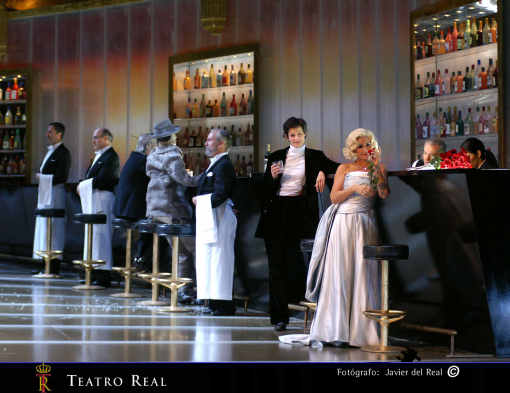Other Links
Editorial Board
- Editor - Bill Kenny
Founder - Len Mullenger
Google Site Search
SEEN
AND HEARD INTERNATIONAL OPERA REVIEW
Handel, Il Trionfo del Tempo e del
Disinganno: Soloists, Orquesta de la Comunidad de
Madrid. Conductor: Paul McCreesh. Teatro Real de Madrid.
2
& 5.11.2008 (JMI)
Production Opernhaus Zurich.
Director. Júrgen Flimm
Sets:
Erich Wonder
Costumes: Florence von Gerkan.
Lighting: Martin Gebhardt.
Cast:
Bellezza: Isabel Rey
Piacere: Vivica Genaux/Anna Bonitatibus
Tempo: Steve Davislim/Kobie Van Rensburg
Disinganno: Marijana Mijanovic/Romina Basso

All afficionados know that Handel wrote
both operas and oratorios and that some are works with both a plot
and a certain amount of dramatic action (Acis and Galatea,
Semele or Theodora, to name but a few). Others however
as is the case with Il Trionfo del Tempo e del Disinganno,
have no action but only a kind of debate between characters
representing psychological archetypes more than real people.
Obviously enough, in this sort of case, the difficulties for a stage
performance are bigger, although they do leave far more degrees of
freedom for the director.
Jürgen Flimm, at present Director of the Salzburg Festival, was
commissioned by Opernhaus Zurich to put this oratorio onto the stage
some four years ago and he locates the debate between the four
personages (Beauty, Pleasure, Time and Disappointment) in a
restaurant, in the 1940s, very late at night and after an opera
performance . By this means Mr Flimm tries to give life to this
oratorio by adding some new allegorical and surreal characters:
death is present, there’s alcohol, drugs, a fashion parade and even
an angel on stage. The libretto leaves everything to Flimm’s
imagination, which is actually rather rich. The stage set has the
above mentioned restaurant separated into two parts, a very long
bar to the right hand and dinner tables to the left, with room in
the middle to work out the discussion and Flimm’s ideas. The
lighting is very good and some very attractive costumes complete
this original production. Flimm does outstanding work with the
singers and extras, with a beautiful final scene, in which he
follows the libretto faithfully ; he then transforms the elegant
Beauty into a nun for before she sings her final Aria. It’s an
imaginative and engaging production.
Musically, things did not fly high at the premiere. We are used to
see baroque operas with great conductors and wonderful orchestras
these days and it is not easy to be pleased with something of a
lower standard. Il Trionfo del Tempo e del Disinganno was
given at the Teatro Real four years ago in a concert version by
Marc Minkowski and Les Musiciens du Louvre and that is not easy to
forget, since it was a kind of musical miracle. Paul McCreesh and
Teatro Real Orchestra are not in the same league sadly. McCreesh is
a good conductor, but the reading was generally rather flat for
most of the opera and only came alive me during the last 30 . The
orchestra is not used to baroque music either and this is a definite
handicap. On November 5th however, things were much
improved.
Isabel Rey interpreted the most important role, Beauty, in both
performances and was something of a disappointment. She sang the
role without much emotion and seemed to have vocal problems in the
upper register, which was not particularly beautiful. She was at her
best in the final aria “Tu del ciel, ministro eletto” for the
premiere but also had to sing in the second cast, replacing Ingela
Bohlin, and sadly things worked worse there. To be fair to Ms Rey
though, it has to be said tha tthree performances in four days of
such a demanding role as La Bellezza would be taxing for anyone.
Vivica Genaux was Pleasure in the first cast and she proved once
again that she is a specialist in baroque opera, particularly in
arias demanding great vocal agility, although he does not reach the
quite same high level in pages requiring pure expressiveness. Anna
Bonitatibus also offered a very good performance in the second
cast. Not as brilliant in coloratura as Ms Genaux, she produced a
great “Lascia la spina, coglie la rosa”, perhaps even better than
her predecessor. Both singers are clearly worthy of a first cast
billing.
The Serbian contralto Marijana Mijanovic covered the part of
Disinganno in the first cast. She is a singer much praised by
knowledgeable people although this role might not have found her at
her best. The voice sounded small, particularly in the lower
register and with problematic vocal projection. She seemed to me
more suited to studio recording than to live performances, at least
in a big house. Romina Basso was much better in the second cast,
even though she is not a true contralto. She gave a very convincing
interpretation of the role and she deserved to be in the first cast
The The Australian tenor Steve Davislim offered a good voice as Il
Tempo although with a style not too suited to this repertoire. Kobie
Van Rensburg offered a more convincing interpretation, more fitted
to the baroque, although lacking some Mr. Davislim’s vocal quality.
Unusually, the Teatro Real had some emptyl
seats, even though young people could buy tickets with a 90 %
discount. The biggest ovations were for both Pleasures and to Romina
Basso. McCreesh and the orchestra had a very warm reception on
November 5. No-one from the production team was present at the
final bows, not even on the night of the premiere.
José M Irurzun
Picture © Javier del Real
Back
to Top
Cumulative Index Page
